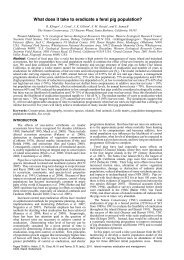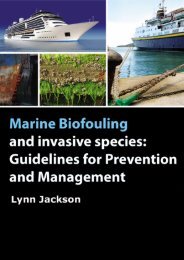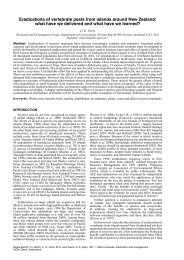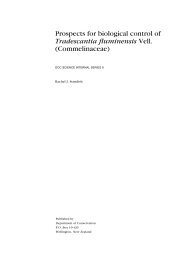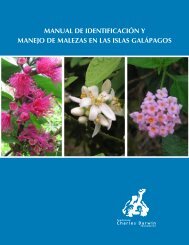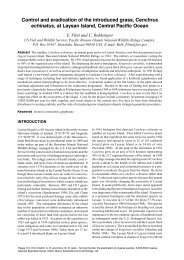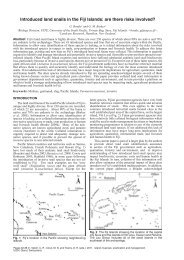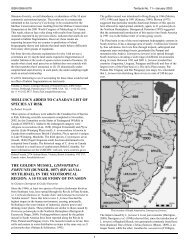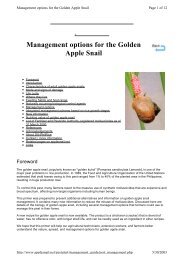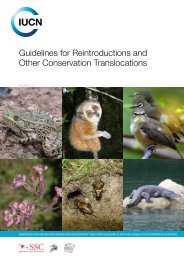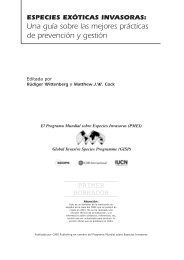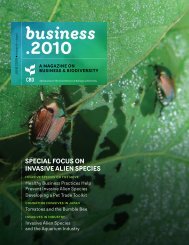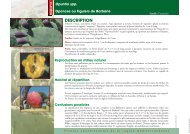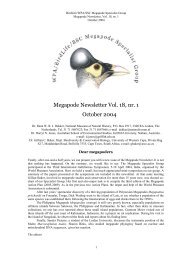Aliens Newsletter - ISSG
Aliens Newsletter - ISSG
Aliens Newsletter - ISSG
Create successful ePaper yourself
Turn your PDF publications into a flip-book with our unique Google optimized e-Paper software.
...And other news<br />
Great Britain authorises the use of a weed<br />
biocontrol agent for the first time in Europe<br />
On 9 th March the UK Wildlife minister authorised<br />
the release of the psyllid Aphalara itadori<br />
for the control of Japanese knotweed, one of the<br />
IUCN’s top 100 invasive species. This is the first<br />
time that an EU Member State has taken such a<br />
move and the project may be of interest to other<br />
Member States where this species is a problem.<br />
Japanese knotweed, Fallopia japonica was<br />
brought to the UK in the early 19 th Century as a<br />
prized garden plant but soon moved from prizewinner<br />
to pariah after showing its ability to<br />
spread and its resistance to control. Despite its<br />
inability to spread by seed, at least in the UK, it<br />
is remarkable that it is now to be found in almost<br />
every corner of the country. Research into potential<br />
agents for a classical biological control programme<br />
was initiated in 2003 and CABI scientists,<br />
in collaboration with a Japanese team at the<br />
University of Kyushu and many others, were able<br />
to select the psyllid as the most promising of<br />
more than 180 insects that feed on the plant in<br />
Japan. Six years of host range testing, following<br />
International protocols, were carried out in quarantine<br />
in the UK and the sap-sucker was shown<br />
to be a true specialist with a clear preference for<br />
the target weed and an inability to develop on any<br />
non-target plants of concern.<br />
Whilst the science was not always easy, the novelty<br />
of the project for Europe presented the challenge<br />
of navigating European and national legislation<br />
that was not designed with the release<br />
of biocontrol agents in mind. For release to be<br />
authorised, two legislative pathways had to be<br />
pursued: the Wildlife and Countryside Act<br />
1981 to legalise the release into the wild of a<br />
non-native species, and the Plant Health Act to<br />
free it from the Plant Health Quarantine Licence<br />
under which it is being held. As an organism liable<br />
to be injurious to plants in the UK, it was<br />
clear that the psyllid would be best considered<br />
under European Plant Health Regulations effectively<br />
as a “beneficial pest”. Thus the EPPO Pest<br />
Risk Analysis template was used to provide the<br />
information necessary for consideration by various<br />
experts, independent peer reviewers and finally<br />
a 3 month public consultation. Many people<br />
are acutely aware of the impacts of the cane<br />
toad in Australia which was often mentioned in<br />
the media as an example of biocontrol gone<br />
wrong. However, the extensive information provided<br />
has helped ensure that the general public<br />
mood in the UK is supportive of the proposal.<br />
The decision generated considerable national<br />
and international interest in the press, television<br />
and radio as well as in other fora. The project,<br />
funded by a consortium of bodies, is being delivered<br />
against a backdrop of increased awareness<br />
of invasive species issues and a reduction<br />
in the number of pest control products available,<br />
not to mention a decrease in the acceptability of<br />
the use of chemicals in the eyes of the public.<br />
The project is now set firmly within the policy<br />
framework of the “Invasive Non-native Species<br />
Framework Strategy for Great Britain” and its<br />
pursuit through the relevant regulatory regimes<br />
may set a helpful precedent for other EU countries<br />
in undertaking similar projects. The carefully<br />
controlled release process is expected to<br />
start in Spring 2010 and will be accompanied by<br />
a detailed monitoring programme.<br />
Further reading:<br />
http://www.defra.gov.uk/corporate/consult/japa<br />
nese-knotweed/letter.htm<br />
http://www.cabi.org/japaneseknotweedalliance<br />
Shaw RH, Bryner S, Tanner R (2009) The life<br />
history and host range of the Japanese<br />
knotweed psyllid, Aphalara itadori Shinji:<br />
Potentially the first classical biological<br />
weed control agent for the European<br />
Union. Biological control 49:105-113.<br />
Japanese knotweed (Fallopia japonica). Photo: Riccardo<br />
Scalera<br />
Code of Conduct on aquatic plants in The<br />
Netherlands<br />
After years of negotiations on February 23 rd 2010<br />
a Code of Conduct on aquatic plants has been<br />
signed at the Hortus botanicus of Leiden Univer-<br />
<strong>Aliens</strong> 3



